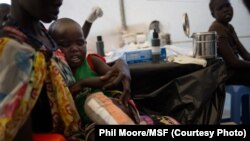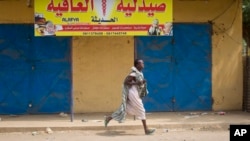JUBA —
South Sudan's fragile health care system has been severely strained by more than five weeks of fighting, with many hospitals in conflict areas shut down and people besieging the few medical facilities that remained open, medical aid group Doctors Without Borders (MSF) says.
In the largest state in South Sudan, Jonglei, only the town of Lankien still has a functioning secondary hospital, MSF Executive Director Arjan Hehenkamp told VOA News in an interview.
"Bor is closed because of the fighting, Akobo the same story, so Lankien has become sort of a central place in health care provision in the entire state of Jonglei," Hehenkamp said.
Most patients come to the hospital for treatment of malaria, kala azar, tuberculosis and other diseases that are commonplace in South Sudan, but MSF has also treated some 170 people with gunshot wounds in the past several weeks, Hehenkamp said.
Most of the wounded were from Bor, the capital of Jonglei state, and Malakal, the capital of Upper Nile state, he said. Both provincial capitals have seen fierce fighting since the unrest erupted in mid-December.
The fighting has not only affected the South Sudanese people, "many thousands" of whom were killed and more than half a million displaced, according to U.N. officials, but has also "massively impacted the conditions of work for humanitarian organizations," Hehenkamp said.
MSF suspended its activities in Malakal two weeks ago after its compound in the town was looted and staff threatened.
Violence in the area had already impacted MSF's activities prior to its compound being looted. MSF teams have been prevented by the fighting from providing thousands of people who sought refuge at the U.N. compound in Malakal with medical assistance, and were forced by insecurity in the region to cancel a vaccination campaign planned for January 13.
MSF's compound in Bentiu, the capital of Unity state, was looted a week before the attack on the Malakal compound.
Even before South Sudan plunged into violence in mid-December, 80 percent of health care and basic services in the young country were provided by non-governmental organisations.
As the fighting spread around the country, the international medical aid group has had to deal with shortages of drugs to treat patients and fuel to run generators, not to mention a sharp increase in the number of people coming to health facilities for treatment.
An agreement signed last week to end the fighting between South Sudanese government troops and opposition forces includes a call for unfettered humanitarian access and the creation and respect of a humanitarian corridor.
"We would anticipate that all the parties in the conflict would do their utmost to ensure that humanitarian assistance can reach those in need," Hehenkamp said.
"However, it has to be organized," he said, adding, "It's early days for the ceasefire; we'll just have to see how it goes."
In the largest state in South Sudan, Jonglei, only the town of Lankien still has a functioning secondary hospital, MSF Executive Director Arjan Hehenkamp told VOA News in an interview.
"Bor is closed because of the fighting, Akobo the same story, so Lankien has become sort of a central place in health care provision in the entire state of Jonglei," Hehenkamp said.
Most patients come to the hospital for treatment of malaria, kala azar, tuberculosis and other diseases that are commonplace in South Sudan, but MSF has also treated some 170 people with gunshot wounds in the past several weeks, Hehenkamp said.
Most of the wounded were from Bor, the capital of Jonglei state, and Malakal, the capital of Upper Nile state, he said. Both provincial capitals have seen fierce fighting since the unrest erupted in mid-December.
The fighting has not only affected the South Sudanese people, "many thousands" of whom were killed and more than half a million displaced, according to U.N. officials, but has also "massively impacted the conditions of work for humanitarian organizations," Hehenkamp said.
MSF suspended its activities in Malakal two weeks ago after its compound in the town was looted and staff threatened.
Violence in the area had already impacted MSF's activities prior to its compound being looted. MSF teams have been prevented by the fighting from providing thousands of people who sought refuge at the U.N. compound in Malakal with medical assistance, and were forced by insecurity in the region to cancel a vaccination campaign planned for January 13.
MSF's compound in Bentiu, the capital of Unity state, was looted a week before the attack on the Malakal compound.
Even before South Sudan plunged into violence in mid-December, 80 percent of health care and basic services in the young country were provided by non-governmental organisations.
As the fighting spread around the country, the international medical aid group has had to deal with shortages of drugs to treat patients and fuel to run generators, not to mention a sharp increase in the number of people coming to health facilities for treatment.
An agreement signed last week to end the fighting between South Sudanese government troops and opposition forces includes a call for unfettered humanitarian access and the creation and respect of a humanitarian corridor.
"We would anticipate that all the parties in the conflict would do their utmost to ensure that humanitarian assistance can reach those in need," Hehenkamp said.
"However, it has to be organized," he said, adding, "It's early days for the ceasefire; we'll just have to see how it goes."





